Leadership & Governance in Africa and Glasgow
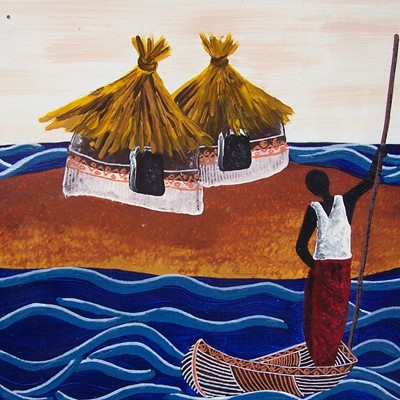
Akan
An Akan becomes an elder by first being selected by his or her older female relatives. Once selected, the elder joins other lineage heads and officials to sit on a council advisory to the Ohene (King). Elders are referred to as nana, though not everyone called nana is an elder. Akan elders open their meetings with prayers and beverages and ask for the ancestors’ continued blessings, protection, prosperity, and happiness for the entire community.
To become an ancestor in Akan culture, the deceased must have been an elder in life. When death comes, his or her female relatives make ritual preparations to facilitate passing of the spiritual personality. Ancestors are separate and distinct from other immortal spirits, and becoming an ancestor requires that one live one’s life from the beginning in anticipation of the end. Eternal existence becomes possible only after one has first achieved the position of an elder. As ancestors, they exist with God, but unlike God, they cannot create or change the created order. They can, however, reincarnate via their spirits to help people.
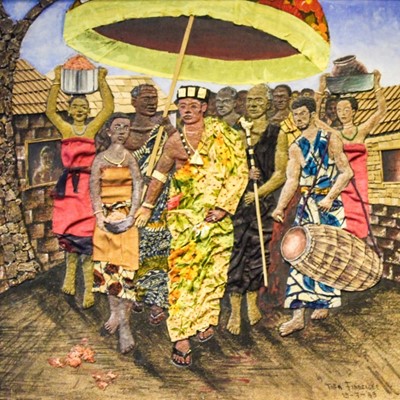
Yoruba
Differences between an older person and an elder reflects a significant shift in personal and collective responsibilities in Yoruba culture. Adult men usually have the responsibility to protect and defend the community, whilst the women are responsible for nurturing and educating the community. Consequently, men are often tasked with obtaining and providing those resources that sustain and advance life for themselves, their families and the community. Women’s time and interests are centred on creating a warm environment conducive to the growth and development of life for them and their families.
The onile is the symbol of Yoruba eldership; it is represented by two iron figurine spikes (one male, one female) joined at the head with a chain. The Yoruba believe that the head is contains the spiritual essence of a person. Symbolising the sacred bond between male and female elders and stressing the importance of ‘the couple’, the onile’s emphasis on sexual attributes is designed to convey the mystical power of procreation and the omnipotence of the elders. Male elders take on the role of Baba Agba, which means ‘senior’ or ‘nurturing’ father’, while female elders take on the role of Iya Agba, which means ‘senior’ or ‘warrior’ mother. Women elevated to the status of eldership are devoted to protecting and defending the spiritual balance of the community, whereas men are dedicated to securing and establishing its spiritual harmony.
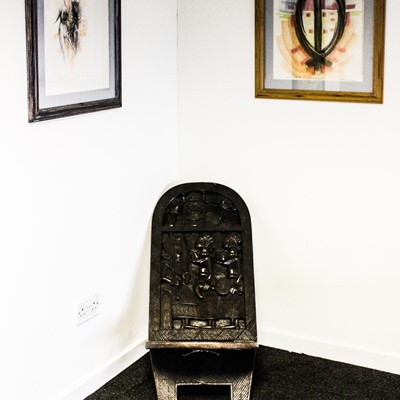
Nigerian Chiefs
Chiefs in Nigeria are not constitutionally recognised but are legally recognised and it is a criminal offence to pose as one. They are often found on the state council of traditional rulers, and chiefs of each state there.
Chief Josephine Oboh MacLeod, Esan, Nigeria, on chiefdom in Nigeria:
“I believe there were female Chiefs before, but I don’t have the records that’s why recording these things are very important. You know, I believe that if the Chief, the female Chief, had had her ceremony done properly, she should actually try and archive them. Because I don’t have the record and when I ask the Director of Chieftaincy Affairs, they claim that the only record they know is the record on the archive that’s the Government people, and also the Governments in Edo State have also put in laws down that if you, you can wear the coral beads and carry an ox-tail all you want (that means respect and everything), to wear it in marriage, to wear it around, but if you say “Oh, I am a Chief” and you, oh, you are perpetrating and trying to make people believe that they a chief with your coral, that may be six years imprisonment without any fine, which is quite a serious fine for it and I, I, I fear that, em, unfortunately, maybe that might be discouraging to people who have not gone or their parents have been chiefs and did not gone to actually certify themselves, to come out because they don’t know if the Government officials might turn the book on them, to say you did not come to certify and you are claiming to be a chief and it’s imprisonment and that, that's, you know, it’s a serious, serious offence really, unfortunately, with the Government’s edicts, which is correct. A chief from my kingdom, in Edo State, also was almost caught after his ceremony on that technicality, for giving an interview to a journalist before coming to, to get him Government documentation. The Government contacted him and was putting the edict on him. That was where I was really afraid of edicts.”
Abdualle, Mende, Freetown, Sierra Leone, on leadership battles in his culture:
“It’s like a battle. You might have two people the same age, so they might have to battle for that. The younger ones, you know, they are young so they know it’s not their time yet, but when they go to people that’re the same age, they go into battle for that, so the person that won will be the head of the town. So, he will be, you know, like he will be the chief that, you know, everybody come that reports to.”
Chief Suliman Chebe, Sissala, Ghana, on how wisdom is gained in his culture:
“You see, in Sissali tradition, for example, wisdom is gained through, ehm, experience of life, you know… Wisdom is achieved by serving, so they served their time, they are old, so everybody looks after them.”
Iko Prince Meko, Ohafia, Nigeria, on elderly people in his culture:
“Old people are like, we see them as gods in my culture. We respect them by, we take care of them, and we pay homage to them and then we keep them, help them, we support them.”
Aya Rashid, Nigeria, on the elderly in his culture:
“To say they are respected is an understatement. They are worshipped. We adore them. People, elderly, even if they are not yours, you don’t have to know them. Because respect and obedience has been embedded in your heart from your home.”
Ali Abubakar, Zanzibar, on respect for your elders in his culture:
“You kind of automatically respected people that were older than yourself, not only from your family but throughout. Looking back, also, you probably, as a younger person, believe everything that the older person said. You would be at your best manners outside because of an older person, and a person could check you, even if he was a member of your family or not, and ehm, you have no reason to complain or to go and tell your Daddy (laugh), that that happened, because they would be double checking (laugh).”
Kwaka Amankwah Frimaponna, Kumasi, Ghana, on his family in Ghana:
“My family is a royal family, that’s why my name is Nana. I am one of the king of the village in Ghana. We are all okay there… We are one of the community in Kumasi… We organise the schools, we do everything over there.”
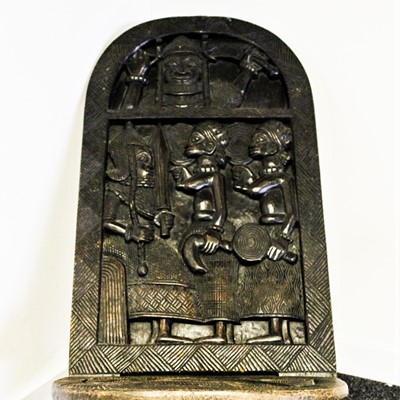
Alkalos in Gambia
Alkalos are the traditional Gambian village chiefs. They were traditionally taken as leaders from the founding family of a village. In modern times they are elected. They previously shared power with the religious leader of the village. They also (as today) acted as arbitrators in disputes.
Sarjo Koita, Mandinka, Gambia, on leadership in his culture:
“In the village we have a compound and that compound is headed by the elders of the compound. And that hierarchy, chain, is the first. If the elders, like the father passed away. The eldest shall become head of the compound. And if that one passed, the next one to him. But it has to be, like, for male, you know, male sides that look after. Even though the mum is there…but, when come to administration of the compound, you consult the mum. But the entire administration of the compound lie down on the head of the compound… So, the compound…we have what we call cabille or clan. You call it a clan. And that clan, also, there is a head of that clan. You can have...a clan can be comprised...it depend on the size of the village. It can be comprised of ten or more compounds. And that one…the elders of that clan. So, and what they will do, if there is a dispute between people in that…and the compound heads cannot resolve it…they pass it on to the clan head. The clan head will call the two and resolve the dispute. After that clan, you have what you call the village alkalo. And the alkalo is the administrative which have link with local government. That is called…that’s the head of the village. So, if those clan heads cannot resolve anything. It is passed on to that alkalo. The village head, who will call them and resolve the problem. And that village head, also will be in an administrative area which comprises of different villages. And that different villages is headed by a chief. And that chief…all the alkalos will be answerable to that chief. So that chieftaincy also. There’ll be different chieftaincy put together and they become a division. Then you have what you call a divisional commissioner. That divisional commissioner will also be…the oldest chieftaincies. These chiefs will be answerable to their commissioner also. All the divisional commissioners…There will be different divisions also. Like, Gambia, you have CRI, West Coast and Cal. And all these divisions will be answerable to the President. Before it goes through a family line, like, is my family are the chiefs. My father is the chief. If my father passed away and he has siblings, brothers or sisters. The one next to him will be the chief. Not his son. No, no sorry the brother of my father. That would be an uncle to me. Would be the chief. That one…if there’s no one like that there. The next one…if there is nothing of that then the eldest son of the family will take it. But now that has changed. It has to go to a ballot. They’ve changed it to a ballot now. It’s open to anyone. That’s the change from this regime. This last regime. Commissioners are selected by the President.”
Sarjo Koita, Mandinka, Gambia, on leadership in Glasgow:
“Well, no, no. The only thing we compare is our homes. Like I explained to you. I’m the head of my family and my wife. So, the children…the eldest, my eldest child is my daughter. So, I make sure that the siblings, the youngest, is realised that these are their elders. If we are not there she is in charge. If she is no there, the one next to her, is their brother, is in charge. My children can all explain this to you.”
Blandine Damsk, Bafoussam, Cameroon:
“We believe they are guardians of our culture so how do you treat someone who are keep your secrets? You should keep them like you hold an egg, so you should cherish them, you should respect them. Older people for us, they are, you shouldn’t, you shouldn’t speak back or fight them back, you should respect them so they are like should I say the most important person like councillors or presidents, they are very important.”
Lydie Bere Flere Dossa, Akan, Ivory Coast, on leadership in Glasgow:
“In Scotland here, you don’t have any chiefs here. You don’t have it. You have only families. And, eh, families, you gather sometime together to have some meeting for us to discuss about the…any issue that you want to discuss. Like, eh, last time, last year, eh, all the Ivorian community and the neighbouring. You have the big meeting. It was discussing about the new law who is coming in for independence. Things like this, you know… And is some people have some problem with the council. They can’t read very well the letter. That doesn’t understand it. So, sometime they call us. You can go and give them help by reading the letter to explain them, “No, you and I gonna go to the meeting and eh, I’m gonna be in charge” …and explain to them, and explain to you help each other this way. But there is no chief or somebody who is responsible. No, no you don’t do that one here.”
Gloria Oju Onyekwere, Kaduna State, Nigeria: on leadership in her culture:
“You have the king, then you have the chiefs, then you have the king makers. You have the elders and you have the old mother. It’s kind of hierarchy. It climbs down… Old mother is more of the women that married. Are already married. They remain the old mother. When they have something very hard to tackle. Maybe something…maybe somebody is not listening. Or, a woman married into the village is just being heard. They get the old mother to come and speak. And once the old mother come and speak. If you don’t do it hell is let loose.”
Sean Thomas, Lagos, Nigeria, on respect for elders in his culture:
“Respect for elders is something that is innate, is taught the minute you come out the womb. Growing up in Africa, you have to be quite respectful to your elders. It’s, it’s a must. It’s a responsibility. It’s a social responsibility. It’s a moral responsibility more. That. I think, I think uhm…respect for elders…both male and female, irrespective of sex. Irrespective of…as long as they’re older than you. You’re inclined to give them some sort of respect, uhm, hence the reason why in Africa we call people Uncles and Aunties. You don’t just call people by name. You’ve got to always add Uncle this…Auntie that…and it all matters as a sign of respect… Depending on where you come from, depending on the locality, sometimes are ruled by, ehm, Chiefs, or, or Kings, and they, they can make the rules and govern the way that community acts and relates with themselves. Ehm, in Lagos we have the Oba, who is, which is mean, Oba means King… In the North they have the sultans. In the East, I’m sure they have, ehm, the Igbo chiefs.”
Rohay Conteh, Mandinka, Gambia, on Alkalo leadership in her community:
“We have chiefs, we have akalos for the community. Alkalo is more like a chief who represent that kind of community. When it comes to talking about anything in the community. Yeah, Mandinka’s call it alkalo.”
Rohay Conteh, Mandinka, Gambia, on respect in her community in Glasgow:
“Yeah, people respect each other. Especially younger children respect the adults most of the time. But, yeah, people treat each other quite good.”
Kaddi Jatu Jobe, Mandinka, Gambia, on leadership in her culture:
“So, my towns got a mayor, yeah, so, so you have like mayors in Banjul and Serekunda. And in Brikama. No, in Brikama, I think they have councillors. So, from western division, all the way to the provinces, they have chiefs and they have councillors as well. But we’ve only got mayors in these two towns. Well, Banjul is a city and Serekunda is kind of like a big place as well… The chiefs are mainly in the villages.”
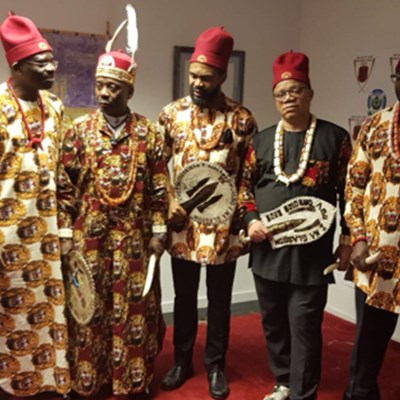
The Gambian Association in Glasgow
The Gambian Association in Glasgow promote community events, such as Eid celebrations and cultural festivals, through networks and social media. They make it clear that everyone is welcome to attend their events, regardless of country of origin or religion. We have it anecdotally that in, Muslims and the Christian minority often attend one another’s religious festivals. They also have close cultural ties with the Senegalese, which, we have it anecdotally, are continued in Glasgow. They perform community leadership roles, such as fundraising for a body to be repatriated when someone has passed away.
Kaddi Jatu Jobe, Mandinka, Gambia, on governance in Glasgow:
“Yeah, well usually they have the chairman of the Association. The Gambian’s Association. So, it’s the same everywhere. So, when I came here…my friend’s dad is the chairman of the Gambian Association as well. So, they tend to, like, mobilise people and organise events. And we have a website. So, if something is happening then everyone can know. Like the Eid celebration. Well, you cook what you can and we all kind of eat together.”
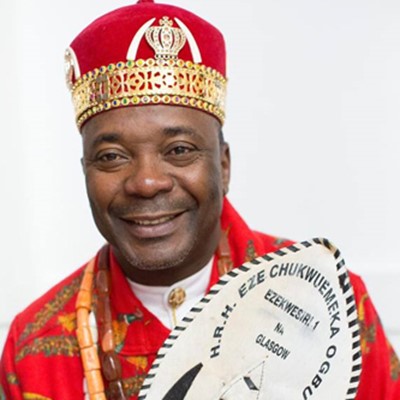
The bantaba tree
The bantaba, which translates from the Mandinka for ‘where to meet’, is the meeting place in the village. It can now be a large concrete or wooden construction with no sides, thus resembling a gazebo. Traditionally it was a large tree that would be the meeting place and a focal point for the village.
Pa Ebou Ngum, Wollof, Gambia, talks about the bantaba tree:
“Well, in the village, you have, like, in villages you have sitting elders. Normally they are the elders of the town. They get together to make decisions or whatever problems that they have. There is what is called a bantaba. It’s a tree. They all sit under the tree, to discuss or solve problems in the village. When something happen, they all come together… It’s an age thing and sometimes it depends on how long you stay in the village. The longer you stay in the village, the more you are expected to be there among the elders.”
Uncles and Aunties
We have it anecdotally that, in many parts of Africa, people who are older than the person addressing them are known as ‘uncle’ or ‘auntie’ as a mark of respect. This is often regardless of whether they are a blood relation or not.
Mariarose Ngosi, Lilongwe, Malawi, on respect in her culture:
“I think, when it comes to respect, eh, as long as you are older, you get that respect. Because everybody is an auntie or an uncle. We hardly call anybody’s names. I don’t know now but then I never call anybody who is an elder a name.”
Mariarose Ngosi, Lilongwe, Malawi, on teaching respect to her son whilst living in Glasgow:
“Not the kids, but we tell the kids. Because if my friends come to my house, I will say ‘auntie’. So, I’ve transferred it…to everybody actually, whether it is a white person who is my best friend. My son calls auntie.”
Next page: Death and Funerals